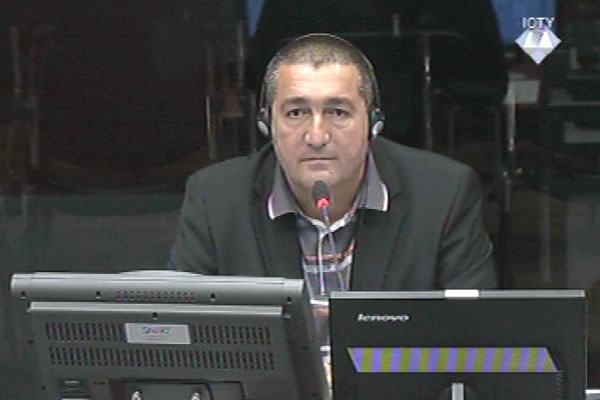Home
DID SERBS ASSIST CROATS FOR HUMANITARIAN OR OPPORTUNISTIC REASONS?
A prosecution witness at the trial of Ratko Mladic has argued that in the fall of 1993 the Bosnian Serb army and police helped Croatian civilians move from Vares to Kiseljak in order to protect them from the BH Army attacks. The prosecution has presented evidence showing that it was done to allow the Serb side to improve its position with a view to carving up BH. The Trial Chamber doesn’t like Mladic’s ‘games’
 Goran Sehovac, defence witness at Rako Mladic trial
Goran Sehovac, defence witness at Rako Mladic trial Goran Sehovac is Ratko Mladic’s first witness after the Tribunal’s summer recess. In 1992, Sehovac fought in the war as a member of a counter-terrorist unit from Han Pijesak. He was then transferred to the Ilidza Brigade and remained there until the end of the war. In his statement to the defense, Sehovac makes no mention of the crimes against Sarajevo civilians listed in the indictment against the former VRS Main Staff commander. Indeed, he says that the BH Army used civilians as human shields and ‘as weapons’: they were forced to approach the Serb positions with explosives strapped around their waists.
Sehovac’s testimony focused on the assistance provided by the Serb army and police to Croats when they fled from Vares in the fall of 1993. The witness said that his unit received an order to assist in the evacuation of the Croat civilians from Vares to Kiseljak. Sehovac described how he joined the effort with much enthusiasm, carrying Croat children on his back and helping other civilians. The witness repeatedly stated that he was ‘very proud’ of the role he played in that operation.
As the defense stated at a hearing before the summer recess, the assistance provided by the Serb army to Croats in BH proved that Mladic didn’t intend to commit crimes against the non-Serbs. The prosecution, on the other hand, noted that the Bosnian Serb leadership used the Croat-Muslim conflict in 1993 to further its own interests. The prosecution argues that Serbs did not help only Croat civilians: they helped the HVO soldiers. Their goal, as the prosecution alleges, was to take parts of the Croat territories and to win an ally against Muslims in the effort to carve up BH.
A document from the Sarajevo-Romanija Corps was shown in court to corroborate the allegation. The document indicates that the Croatian Defense Council sent a request for assistance, and that both civilians and Croat soldiers were moved through the Serb-held territory. Mladic’s Directive No. 5 from June 1993, also shown in court, instructs the subordinated units to ‘exploit’ the Croat-Muslim conflict: they should make sure that Croat weapons do not fall into the hands of Muslims, and Croats ‘should be forced by reasonable acts to hand over their arms and territories to us’. Furthermore, an entry in Mladic’s war diary about a meeting with Slobodan Milosevic in Belgrade quotes Radovan Karadzic as saying that ‘Croats should be given assistance in order to force Muslims to agree to the division of Bosnia’. Letters from the Vares municipality president and from Vinko Puljic, the Archbishop of Vrhbosna, to Croatian president Tudjman were also admitted into evidence. In the letters, the two men express their displeasure with the fact that the people of Vares were forced to leave their homes and hand the territory to the ‘Chetniks’ following the agreement of the top leaders.
The prosecutor thus concluded that it was not a humanitarian effort to evacuate the civilians before the BH Army launched its attack, but an agreement reached by the Serbs and Croats to carve up BH. Sehovac replied that he only spoke in ‘the spirit of the rescue’; he knew nothing about high politics and agreements reached by the top brass. Sehovac completed his evidence today, and the defense will call a new witness tomorrow.
The accused Mladic seems to have forgotten the Trial Chamber’s strict instructions during the Tribunal’s recess. The Trial Chamber has prohibited Mladic from communicating with his defense counsels aloud and to signal to the witnesses in any way. Today Mladic did both. He stopped only after he was warned that he would be removed from the courtroom. ‘The Trial Chamber doesn’t like your games’, the presiding judge said to Mladic after issuing the last warning. The witness was also cautioned not to salute or address the accused in any way.
Linked Reports
- Case : Mladic
- 2014-07-24 DOUBLE GENOCIDE REMAINS IN MLADIC’S INDICTMENT
- 2014-07-24 WITNESS: WE AVOIDED MLADIC LIKE PLAGUE
- 2014-07-23 NON-SERB PATIENTS IN SERB HOSPITAL
- 2014-08-26 DOCUMENTS FULL OF ‘ERRORS’
- 2014-08-27 PROSECUTION CALLS FOR OPPORTUNITY TO PRESENT TOMASICA EVIDENCE
- 2014-08-28 NO POINTS FOR PRESENTATION
